Russia in Syria: whose side is Vladimir Putin on?
Several theories have been put forward about Putin's motivation for intervening in the Syrian war
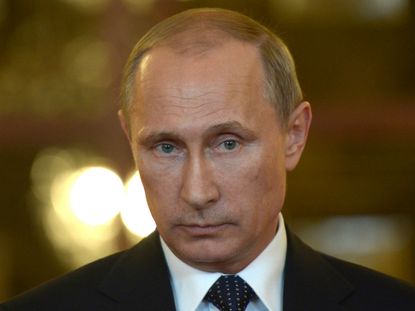
The downing of a Russian plane by Turkey over the Syrian border has complicated a Middle Eastern conflict that was already intensely complex.
When Russia moved troops, tanks, combat jets and helicopters into Syria in September, many feared an escalation in the multi-player war.
Nevertheless, the move led to the opening of new avenues of communication between Russia and the West, partly to prevent accidents in the busy skies above Syria. When Islamic State blew up a Russian passenger jet and massacred Parisians, Russia and the West appeared close to agreement on the urgency of tackling the militant group.
Subscribe to The Week
Escape your echo chamber. Get the facts behind the news, plus analysis from multiple perspectives.

Sign up for The Week's Free Newsletters
From our morning news briefing to a weekly Good News Newsletter, get the best of The Week delivered directly to your inbox.
From our morning news briefing to a weekly Good News Newsletter, get the best of The Week delivered directly to your inbox.
Then Turkey, a member of Nato, shot down a Russian jet on Tuesday, leading to angry words on both sides, and diplomatic retaliation from Moscow.
Hollande will meet Vladimir Putin this evening as he tries to stitch together an international coalition against IS – but what exactly does the Russian president hope to achieve in Syria? Here are some of the theories put forward about Putin's motivation for intervening.
Simply fighting terrorism
Russia insists it is trying to bring stability to Syria in the face of terrorism. Putin has said Syrian President Bashar al-Assad should be part of the efforts to contain the IS militants, although the West believes Assad's regime is part of the problem. Russia has warned that destroying Assad's government would create a situation similar to that in Libya, where the state institution has "disintegrated". He has previously suggested there is "no other solution" to the Syrian crisis apart from strengthen government structures and helping to fight terrorism – while also urging them to "engage in positive dialogue with the rational opposition, and conduct reform". But while Russia says it has been targeting IS, a Reuters report last month claimed that almost 80 per cent of Russian air strikes on Syria had not been on areas held by the militant group.
A point of principle
Mark Katz, a professor at George Mason University who specialises in Russian foreign policy and the international relations of the Middle East, suggested Putin saw intervention in Syria as a "point of principle". Syria might no longer be a hugely valuable ally to Russia in itself, but Putin knows his actions will be viewed across the world. "Part of it is he wants to be seen as remaining loyal to his allies, because if he pulls the rug out from under Assad, what does this mean for his relationship with Central Asian dictators?" Katz told ABC News.
Potential to bargain with the West
One theory is that Putin is hoping he can strike a bargain with the US and Europe by trading off his involvement in Syria for a deal over the Western sanctions imposed on Russia for its involvement in the Ukraine conflict, reports Vox. Putin could offer to step back from Syria or offer military assistance and intelligence to help the West fight IS in return for a "grand bargain" back in Europe. Putin has already signalled a willingness to cooperate with the West over Syria.
Retain influence in the Middle East
Another theory, posited by Vox, is that Putin is trying to retain his last toehold in the Middle East by shoring up his influence in Syria, one of his few global allies. Iran has proved to be Assad's strongest sponsor, with military equipment and boots on the ground. Vox suggests Russia feels pushed out by Iran and wants to reinstate its own influence. "This military intervention makes Russia a significant player within Syria again. It forces Assad to once again rely on Moscow," says the news site.
Retain influence in the world
It is important for Putin to show his domestic and foreign audience that Russia is a vital partner for America in the fight against IS and jihadist terror in general, says the Economist. "Such a coalition underlines Russia's continuing status as a great power, and helps bring it back in from the cold, ending the long stand-off between Russia and America over Ukraine," it explains. Assad may eventually be eased out in a deal partly brokered by Russia, but Putin will want to make that deal from a position of strength. Fyodor Lukyanov, Moscow-based editor of the journal Russia in Global Affairs, says Syria was once an important partner for Russia, but now it is "much more about Russia's general credibility as a big power able to constructively settle international crises".
Other domestic reasons
Putin has said he wants to tackle Russian-born extremists who are now fighting in Syria and may return to cause chaos – a similar argument made by David Cameron in his push to extend military action to Syria. Andranik Migranyan, a prominent foreign-policy expert with connections to the Russian government, claims Russia's intervention was "win-win" for Putin: "If the Russian attacks succeed, he's shown leadership; if they fail, the intervention will have killed lots of bad people, to the world's benefit, and the blame for the failure will still rest mainly on the United States and its coalition for not cooperating with Russia."
As for Putin's furious reaction to Turkey, Dr Natasha Kuhrt, from King's College London, says this is likely to be "more for domestic consumption than real substance". Mark Galeotti, a professor at NYU's Centre for Global Affairs, also suggested Putin was likely to react with a "symbolic act" and then hope for "even the faintest signs of contrition from Ankara", which would allow him to tell the Russian people that "the Turks messed up, the Turks have acknowledged that, we move on".
Create an account with the same email registered to your subscription to unlock access.
Sign up for Today's Best Articles in your inbox
A free daily email with the biggest news stories of the day – and the best features from TheWeek.com
-
 The hunt for Planet Nine
The hunt for Planet NineUnder The Radar Researchers seeking the elusive Earth-like planet beyond Neptune are narrowing down their search
By Chas Newkey-Burden, The Week UK Published
-
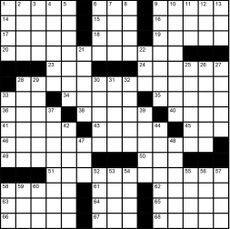 Magazine interactive crossword - April 26, 2024
Magazine interactive crossword - April 26, 2024Puzzles and Quizzes Issue - April 26, 2024
By The Week US Published
-
 Magazine solutions - April 26, 2024
Magazine solutions - April 26, 2024Puzzles and Quizzes Issue - April 26, 2024
By The Week US Published
-
 How would we know if World War Three had started?
How would we know if World War Three had started?Today's Big Question With conflicts in Ukraine, Middle East, Africa and Asia-Pacific, the 'spark' that could ignite all-out war 'already exists'
By Harriet Marsden, The Week UK Published
-
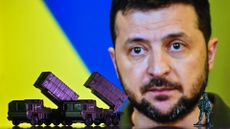 Will Iran attack hinder support for Ukraine?
Will Iran attack hinder support for Ukraine?Today's Big Question Pro-Kyiv allies cry 'hypocrisy' and 'double standards' even as the US readies new support package
By Elliott Goat, The Week UK Published
-
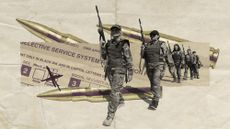 The issue of women and conscription
The issue of women and conscriptionUnder the radar Ukraine military adviser hints at widening draft to women, as other countries weigh defence options amid global insecurity
By Harriet Marsden, The Week UK Published
-
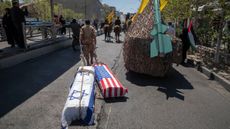 Will Iran risk all-out war with Israel?
Will Iran risk all-out war with Israel?Today's Big Question Tehran has not wanted to be directly involved in the Middle East conflict so far. But that could be about to change
By Chas Newkey-Burden, The Week UK Published
-
 Why is Ukraine backing far-right militias in Russia?
Why is Ukraine backing far-right militias in Russia?Today's Big Question The role of the fighters is a 'double-edged sword' for Kyiv, say commentators
By The Week UK Published
-
 Why is Islamic State targeting Russia?
Why is Islamic State targeting Russia?Today's Big Question Islamist terror group's attack on 'soft target' in Moscow was driven in part by 'opportunity and personnel'
By Elliott Goat, The Week UK Published
-
 Ukraine's unconventional approach to reconstruction
Ukraine's unconventional approach to reconstructionUnder the radar Digitally savvy nation uses popular app to file compensation claims, access funds and rebuild destroyed homes
By Harriet Marsden, The Week UK Published
-
 What does victory now look like for Ukraine?
What does victory now look like for Ukraine?Today's Big Question Not losing is as important as winning as the tide turns in Russia's favour again
By Elliott Goat, The Week UK Published